Skip These Foods and Skip the Pounds
Summer is here in a few short days. You’ve got back yard BBQs and other summer soirees, visitors and many outings that likely have you freaking out about what to eat. Heck, Summer may have crept up on you and you’re still not even bikini season ready, but it’s never too late. Problem is, eating, nutrition and health is so damn confusing now, you just don’t know what you should or shouldn’t eat. It’s hard to figure out if something is healthy or if it is going to kill you.
No worries my friends…I get it. I completely understand. That is why I am here to help. I thought it might be useful to help you with some foods you may think are healthy, but really are not if you want to skip unwanted pounds, and be healthier. Sadly, you think you are being healthy, but the food industry is sabotaging you with all their marketing, sponsored studies and research and fake labeling.
Here’s the cold hard facts about 5 foods to avoid (the list could be much longer, but I know you don’t have all day nor would you remember all of them…let’s start here).
- White Flour – has been processed and refined like white rice, pasta, bread, crackers, cereal, and simple sugars like table sugar and high-fructose corn syrup. It has been stripped of the parts of the wheat kernel that slow its digestion; it’s extremely easy for the body to turn white flour into blood sugar. That’s why it’s best to choose whole grains that are still intact, and foods such as beans, lentils, and wheat berries instead of those made from white flour. Basically, when you are eating “white food” you are eating fake ingredients created in a factory. Although it started as real food, its been stripped of what is real. Your body no longer recognizes it and eating these foods can lead to diseases like cancer.
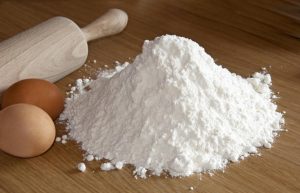
- Juice – Fruit juice is often perceived as healthy. That’s understandable, given that it is natural and has the word “fruit” in it. However, what many people fail to realize is that fruit juice is also loaded with sugar. In fact, fruit juice contains just as much sugar and calories as a sugary soft drink, and sometimes even more. The small amounts of vitamins and antioxidants in the juice do not make up for the large amount of sugar. Fruit juice isn’t always what it seems, even the higher quality types have gone through processing methods that remove the flavor, making it necessary to add “flavor packs” to bring them back to their original state.
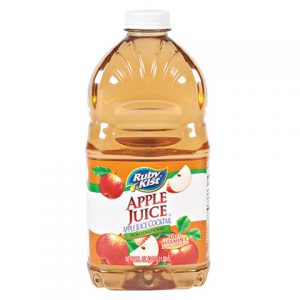
- Chips – As for calories and fat, they’re pretty much in the same ball park as regular potato chips. Calories range from about 125 to 160, while fat is about 10 to 11 grams per ounce. You can always find exceptions to the rule like in Good Health Natural Food Veggie Chips, which have a bit less fat at 7 grams per ounce. Veggie chips don’t usually have a laundry list of unidentifiable ingredients, but neither do potato chips. Potatoes, oil and salt are typically the ingredients found in potato chips– veggie chips are no different except for the type of veggie used. The types of oil vary based on brand. Popular brands of veggie chips use canola, safflower or sunflower oil (or a combination of these oils). No matter which type of oil is used, they all contain 120 calories per tablespoon. Don’t be duped by the word “veggie” in their title. A serving of veggie chips isn’t a healthy substitute for fresh, frozen, or even canned veggies. One serving of veggies contains 25 calories and many vitamins, minerals and phytochemicals (plant chemicals that fight disease). Once the veggies are processed into chips, many of the vitamins and plant chemicals are destroyed. This leaves you with a food that’s much higher in calories and fat with fewer nutrients. Clever marketing has made consumers believe “veggie” chips are healthy. Let’s not forget that potatoes are a veggie too. If you’re in the mood for a salty snack, opt for a handful of lightly salted nuts.
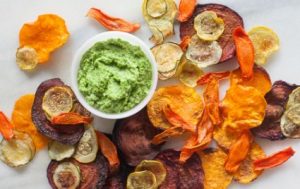
- Yogurt – can be very deceiving. While real yogurt can be good for you, most yogurts aren’t, and sadly that is what most people are eating. The majority of yogurt available in the grocery store is flavored, which means full of sugar and/or artificial sweeteners. These additives feed the bad bacteria in the gut, which basically negates the benefits of the probiotics. Forgo the flavored yogurts (we’re looking at you, chocolate and caramel toppings), for the plain (protein- and probiotic-packed) tangy version we know we’re supposed to be eating. Besides, don’t DIY toppings like unsweetened coconut, mango or cinnamon sound so much better than the sugary stuff?
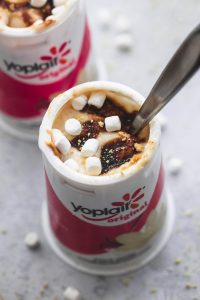
- Granola Bars – are another deceitful food due to so many bad choices out there. While brands like Quaker Oats and Nature Valley may be the kings of the granola bar aisle, they typically rank low in the hierarchy of good nutrition. Containing as many as 25 ingredients, 12 grams of sugar, and sugar-filled ingredients like a chocolate, these babies can be almost as bad as eating a real candy bar (a Twix Bar contains around the same amount of calories and sugar as an average granola bar). Reading the nutritional information is key to making the best choices, and the more recognizable the ingredients, the better. Many granola bars are fortified with vitamins and minerals, and while fortification is not a replacement for eating a well-balanced diet, it can help to make up for lacking nutrients. Look for bars that are high in fiber (containing at least 5 of the 14 recommended grams per day), which can prolong that full feeling and possibly reduce “bad” LDL cholesterol , and options with less than 25% of the calories from sugar and 3 grams of fat or less.
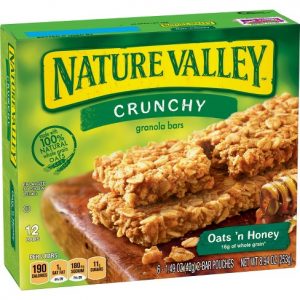
I would be remiss if I did not end this by saying the one thing you need to do – not only to keep weight off, but more importantly – to save your life is to avoid all processed foods. What does processed mean? Well basically, it means food has been stripped from its natural nutrients and made into a Frankenstein of what it used to be pumped with sugar and other additives that are just as addictive as cocaine to keep you coming back for more and more food. Do yourself a favor, stop eating processed foods.
Are you confused about food? What confuses you the most? Contact me for a free 30-minute consultation.





Good stuff Denise. Caught this blog through LinkedIn post. Best, Greg